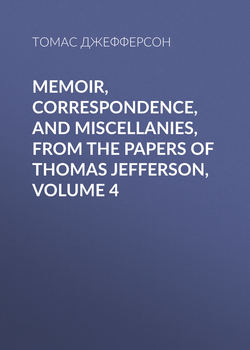Читать книгу Memoir, Correspondence, And Miscellanies, From The Papers Of Thomas Jefferson, Volume 4 - Томас Джефферсон, Thomas Jefferson - Страница 30
LETTER XXX.—TO THE EMPEROR OF RUSSIA
ОглавлениеTO THE EMPEROR OF RUSSIA.
Washington, April 19, 1806.
I owe an acknowledgment to your Imperial Majesty, of the great satisfaction I have received from your letter of August the 20th, 1805, and sincere expressions of the respect and veneration I entertain for your character. It will be among the latest and most soothing comforts of my life, to have seen advanced to the government of so extensive a portion of the earth, and at so early a period of his life, a sovereign, whose ruling passion is the advancement of the happiness and prosperity of his people; and not of his own people only, but who can extend his eye and his good will to a distant and infant nation, unoffending in its course, unambitious in its views.
The events of Europe come to us so late, and so suspiciously, that observations on them would certainly be stale, and possibly wide of their actual state. From their general aspect, however, I collect that your Majesty’s interposition in them has been disinterested and generous, and having in view only the general good of the great European family. When you shall proceed to the pacification which is to re-establish peace and commerce, the same dispositions of mind will lead you to think of the general intercourse of nations, and to make that provision for its future maintenance, which, in times past, it has so much needed. The northern nations of Europe, at the head of which your Majesty is distinguished, are habitually peaceable. The United States of America, like them, are attached to peace. We have then with them a common interest in the neutral rights. Every nation, indeed, on the continent of Europe, belligerent as well as neutral, is interested in maintaining these rights, in liberalizing them progressively with the progress of science and refinement of morality, and in relieving them from restrictions which the extension of the arts has long since rendered unreasonable and vexatious.
Two personages in Europe, of which your Majesty is one, have it in their power, at the approaching pacification, to render eminent service to nations in general, by incorporating into the act of pacification, a correct definition of the rights of neutrals on the high seas. Such a definition, declared by all the powers lately or still belligerent, would give to those rights a precision and notoriety, and cover them with an authority, which would protect them in an important degree against future violation; and should any further sanction be necessary, that of an exclusion of the violating nation from commercial intercourse with all the others, would be preferred to war, as more analogous to the offence, more easy and likely to be executed with good faith. The essential articles of these rights, too, are so few and simple as easily to be defined.
Having taken no part in the past or existing troubles of Europe, we have no part to act in its pacification. But as principles may then be settled in which we have a deep interest, it is a great happiness for us that they are placed under the protection of an umpire, who, looking beyond the narrow bounds of an individual nation, will take under the cover of his equity the rights of the absent and unrepresented. It is only by a happy concurrence of good characters and good occasions, that a step can now and then be taken to advance the well being of nations. If the present occasion be good, I am sure your Majesty’s character will not be wanting to avail the world of it. By monuments of such good offices may your life become an epoch in the history of the condition of man, and may He who called it into being for the good of the human family, give it length of days and success, and have it always in his holy keeping.
Th: Jefferson.
